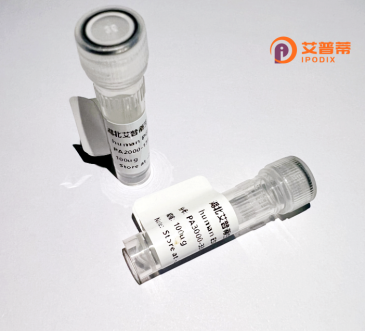
| 纯度 | >90%SDS-PAGE. |
| 种属 | Human |
| 靶点 | ARMC4 |
| Uniprot No | Q5T2S8 |
| 内毒素 | < 0.01EU/μg |
| 表达宿主 | E.coli |
| 表达区间 | 1-1044aa |
| 氨基酸序列 | MGVALRKLTQWTAAGHGTGILEITPLNEAILKEIIVFVESFIYKHPQEAKFVFVEPLEWNTSLAPSAFESGYVVSETTVKSEEVDKNGQPLLFLSVPQIKIRSFGQLSRLLLIAKTGKLKEAQACVEANRDPIVKILGSDYNTMKENSIALNILGKITRDDDPESEIKMKIAMLLKQLDLHLLNHSLKHISLEISLSPMTVKKDIELLKRFSGKGNQTVLESIEYTSDYEFSNGCRAPPWRQIRGEICYVLVKPHDGETLCITCSAGGVFLNGGKTDDEGDVNYERKGSIYKNLVTFLREKSPKFSENMSKLGISFSEDQQKEKDQLGKAPKKEEAAALRKDISGSDKRSLEKNQINFWRNQMTKRWEPSLNWKTTVNYKGKGSAKEIQEDKHTGKLEKPRPSVSHGRAQLLRKSAEKIEETVSDSSSESEEDEEPPDHRQEASADLPSEYWQIQKLVKYLKGGNQTATVIALCSMRDFSLAQETCQLAIRDVGGLEVLINLLETDEVKCKIGSLKILKEISHNPQIRQNIVDLGGLPIMVNILDSPHKSLKCLAAETIANVAKFKRARRVVRQHGGITKLVALLDCAHDSTKPAQSSLYEARDVEVARCGALALWSCSKSHTNKEAIRKAGGIPLLARLLKTSHENMLIPVVGTLQECASEENYRAAIKAERIIENLVKNLNSENEQLQEHCAMAIYQCAEDKETRDLVRLHGGLKPLASLLNNTDNKERLAAVTGAIWKCSISKENVTKFREYKAIETLVGLLTDQPEEVLVNVVGALGECCQERENRVIVRKCGGIQPLVNLLVGINQALLVNVTKAVGACAVEPESMMIIDRLDGVRLLWSLLKNPHPDVKASAAWALCPCIKNAKDAGEMVRSFVGGLELIVNLLKSDNKEVLASVCAAITNIAKDQENLAVITDHGVVPLLSKLANTNNNKLRHHLAEAISRCCMWGRNRVAFGEHKAVAPLVRYLKSNDTNVHRATAQALYQLSEDADNCITMHENGAVKLLLDMVGSPDQDLQEAAAGCISNIRRLALATEKARYT |
| 分子量 | 115 kDa |
| 蛋白标签 | His tag N-Terminus |
| 缓冲液 | 冻干粉 |
| 稳定性 & 储存条件 | Lyophilized protein should be stored at ≤ -20°C, stable for one year after receipt. Reconstituted protein solution can be stored at 2-8°C for 2-7 days. Aliquots of reconstituted samples are stable at ≤ -20°C for 3 months. |
| 复溶 | Always centrifuge tubes before opening.Do not mix by vortex or pipetting. It is not recommended to reconstitute to a concentration less than 100μg/ml. Dissolve the lyophilized protein in distilled water. Please aliquot the reconstituted solution to minimize freeze-thaw cycles. |
以下是3篇关于重组人ARMC4蛋白的参考文献概览:
1. **《ARMC4 mutations cause primary ciliary dyskinesia with randomization of left/right body asymmetry》**
- **作者**: Hjeij R, et al.
- **摘要**: 该研究首次发现ARMC4基因突变与原发性纤毛运动障碍(PCD)相关,导致患者纤毛轴丝结构异常(特别是外动力臂缺陷),造成呼吸道纤毛运动功能丧失及内脏左右不对称发育异常。
2. **《ARMC4 is a conserved component of the flagellar axoneme that is required for mouse spermatogenesis》**
- **作者**: Li Y, et al.
- **摘要**: 通过小鼠模型证明,ARMC4蛋白在精子鞭毛轴丝组装中起关键作用,其缺失导致雄性不育。研究揭示了ARMC4通过调控动力蛋白复合体定位参与轴丝结构的稳定性。
3. **《Bi-allelic mutations in ARMC4 lead to severe respiratory ciliary dysfunction and progressive lung disease》**
- **作者**: Wallmeier J, et al.
- **摘要**: 报道了ARMC4双等位基因突变患者的临床特征,包括新生儿呼吸窘迫、慢性鼻窦炎及支气管扩张。电子显微镜显示纤毛外动力臂完全缺失,为ARMC4在纤毛运动中的分子机制提供病理学证据。
注:以上文献主要发表于《American Journal of Human Genetics》《Journal of Medical Genetics》等期刊(2014-2018年),研究聚焦于ARMC4在纤毛结构与功能、生殖发育及遗传性疾病中的作用。如需具体发表信息或PMID编号可进一步补充。
ARMC4 (Armadillo repeat-containing protein 4) is a member of the armadillo (ARM) repeat protein family, characterized by tandemly repeated motifs of approximately 40 amino acids that mediate protein-protein interactions. Predominantly expressed in tissues with motile cilia, such as the respiratory tract, brain, and male reproductive system, ARMC4 plays a critical role in ciliary motility and cellular signaling. Structurally, it contains multiple ARM repeats that form a curved surface for binding partner proteins, though its full interactome remains under investigation.
Functionally, ARMC4 is essential for the assembly and stability of the ciliary axoneme. Research links ARMC4 mutations to primary ciliary dyskinesia (PCD), a genetic disorder causing impaired mucociliary clearance, chronic respiratory infections, and infertility. In sperm cells, ARMC4 deficiency disrupts flagellar beating, leading to reduced motility and male subfertility. Additionally, aberrant ARMC4 expression has been associated with certain cancers, suggesting potential roles in tumor progression or metastasis, though mechanisms are not fully elucidated.
Recent studies highlight its diagnostic value as a biomarker for PCD and male infertility. Animal models, particularly ARMC4-deficient mice, recapitulate human ciliary defects, providing insights into therapeutic strategies. Despite advances, the precise molecular pathways involving ARMC4 in ciliogenesis and disease pathogenesis require further exploration. Its dual role in structural integrity and signaling positions ARMC4 as a compelling target for research in cilia-related disorders and reproductive health.
×